Teaching your child to play independently allows them to problem solve and build skills on their own.
Many times children prefer your presence, but it is a good idea to encourage them to play by themselves at times.
Always make sure that the area that your toddler is playing in has been childproofed well and is safe.
Here are some easy ways to introduce some independent activities for toddlers in childcare or at home!

(This post contains affiliate links. To read our full disclosure policy click here.)
Benefits of Independent Play
One of the best benefits of independent playtime is it allows you some free time to get other things accomplished or…RELAX.
The child benefits as well as they can grow their imagination and entertain themselves.
They will become problem solvers as they try to complete tasks on their own that may be challenging.
This will lead to boosting self-confidence and encouraging social emotional development.
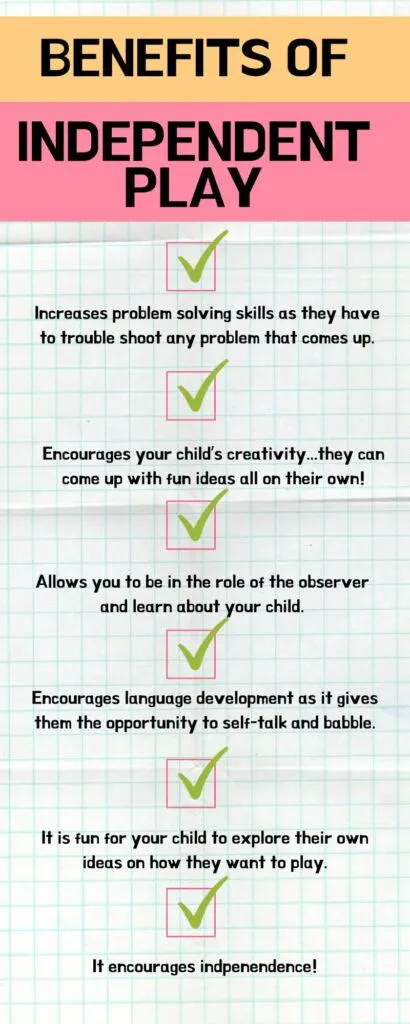
When do toddlers play by themselves?
There really is no magic age when this skill appears.
It really depends on your child’s temperament and personality.
Some children may enjoy playing alone early on…and that is great!
My son is a very social boy and really likes to chat.
Independent play time is something we continue to work on all of the time.
For some children, it may take a bit longer to gain the skills needed to solo play happily.
Just be supportive and you will get there!
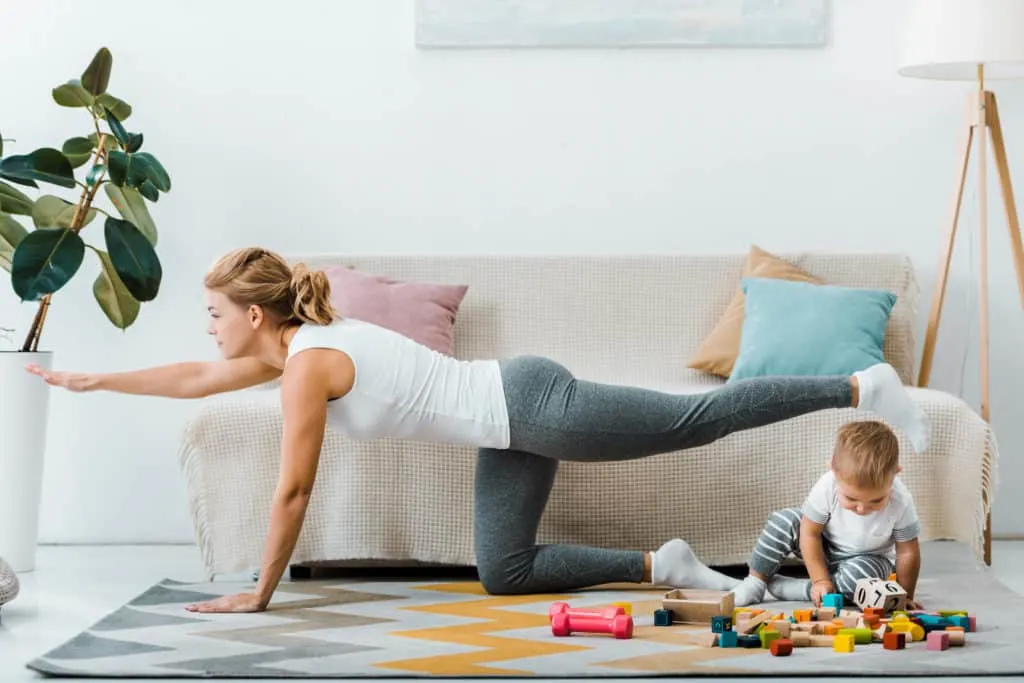
Stages of Independent Play
When it comes to independent play skills it will most likely happen in a few different stages.
At first, you will need to remain near your toddler while they play.
Help them intermittently as they need it.
As they begin to figure things out for themselves you can become more of an “observer” instead of a “participant.”
Then you will move into the stage where you are in the same room…but maybe you are completing a different task.
You could be folding laundry or looking at a magazine while they play nearby.
Eventually, you will get to the stage where they will be able to play without you present.
They may be able to play off in a playroom or bedroom.
Safety always comes first.
Make sure that all areas your child plays in are toddler-proofed and safe and use your best judgement regarding how far you are away from your child.
How to Encourage Your Child to Play Independently
Limit Toy Options
Give them one or two toys to play with that they are interested in.
If you have too many out they will just go from one toy to the next without really engaging in play.
If there is a preferred toy this may be a good option when trying to get your little one to enjoy some alone time.
If your child has access to too many toys then pulling things out may become more fun than actually playing.
Limit the number of toys you allow your child to have access to using the 5-minute rule.
If they were to take out EVERYTHING it should not take longer than 5 minutes to pick up.
If it does then you have too many toys out and some should go into toy storage and be rotated in and out.
RELATED POST: How to Get Your Toddler to Clean Up Toys
Organize Your Toys
Are the toys all out and available for your toddler to grab as many as they please?
I think it is good to let your child have access to toys but if they are all out in the open they may find this to be overwhelming.
Instead of playing with just one toy at a time, they may keep pulling toys out instead of playing.
To limit this behavior have present toys in a way that they have access but are not visually overwhelming.
Keep them in bins that are covered (like this) or have a drape over your toy shelf so they can’t see them all the time.
Take an out of sight, out of mind approach!
Toddler Independent Play Ideas: Pick Engaging Toys
Pick open-ended toys that allow them to be constructive and require them to participate fully such as blocks, dolls, cars, or age-appropriate puzzles (like these).
These are also some of my favorite toys because they allow your child to explore imaginative play as well.
Toys that light up and make noise may seem to be entertaining at first but require less engagement which can leave your child bored quickly.
Distance
Try to distance yourself a bit when your toddler is playing with a toy. This may mean just scooting back a few feet or sitting in a chair instead of right next to them.
Slowly work up to being in the room next door or a safe distance away. Make sure the space your child is playing in is safe and child-proofed well.
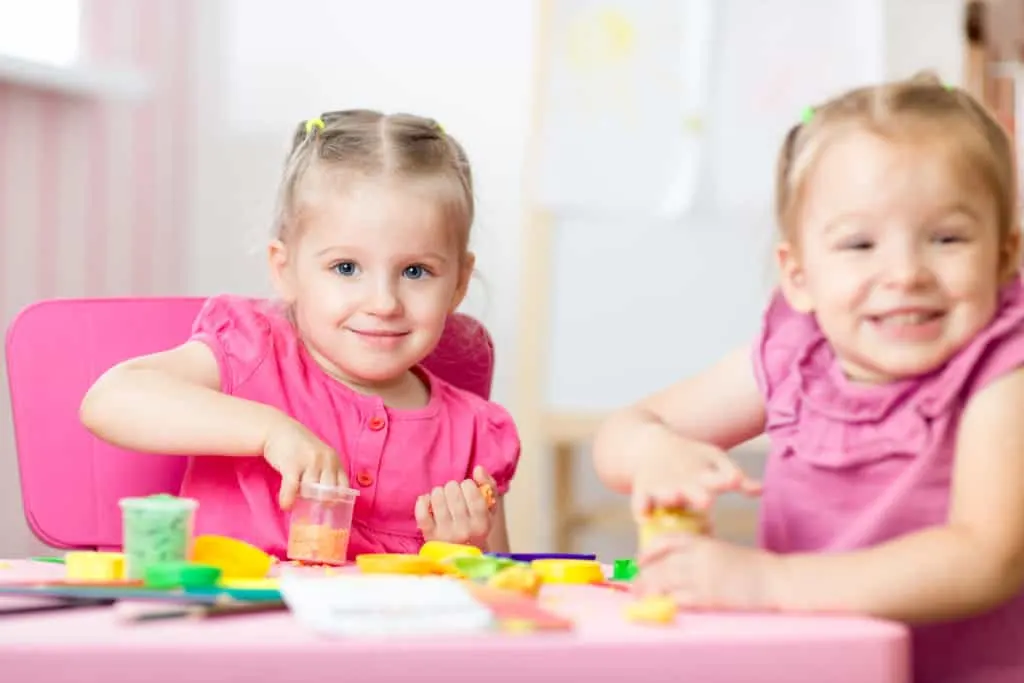
Limit Distractions
A child watching TV is not participating in independent play. Turn
off the television and limit other activities that may distract them from their play.
Teach Them to Play
Before you expect them to play by themselves they may need some ideas on how to actually play.
Model for them how to drive trucks and toy cars around the room or how to stack blocks to make a house.
Show them how to engage with their toys before expecting them to be content with them on their own.
Encouragement
If your toddler has been playing by themselves for even 5 minutes, praise the behavior when you return.
Giving your child positive reinforcement when they have done something special is a great way to make it happen again.
Be Patient
This skill will not happen overnight.
If you are consistent with giving your toddler space and time to play alone they will eventually start to take part in this type of play without any help from you.
Supervised Outdoor Play
One of the places I saw my little one be the most independent is playing outside.
There are so many things that toddlers are naturally curious about outside that it can be an excellent way for them to do somewhat independently-with you supervising of course!
Follow your child as they look around outside and see what they are interested in.
Here you are following their lead instead of being the one who leads the activity.
Outside play gives your child lots of opportunities to build gross motor skills as well as burn off energy!
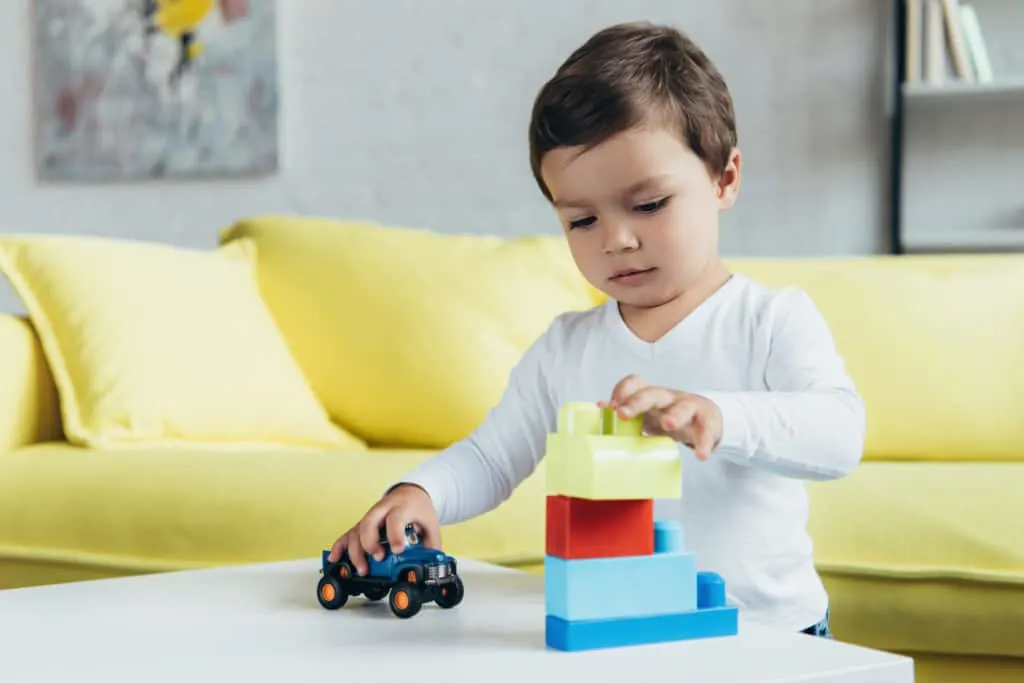
Independent Activities for Toddlers in Childcare or at Home
Unstructured play is very beneficial for children, however, it is also nice to have some ideas for some more structured toddler learning activities.
When looking for educational activities for toddlers keep in mind the 5 areas of development:
- Cognition
- Language
- Social/Emotional
- Motor
- Self Help
If any activity is encouraging skills in ANY of these 5 areas I consider it beneficial for education.
Educational activities should not just be limited to academic themes such as letters and shapes at this young age.
Most of the activities below you will need to set up and your child may need some guidance to start depending on how old they are.
Once they seem to have a good idea of how to complete the activity, stand back and enjoy!
Educational Activities for Toddlers
Here are a few activity ideas that you can set up for your toddler and let them completely independently.
You know your toddler best so choose activities that are challenging, but not so hard that they just give up.
If they ask for help give them encouragement to find a solution on their own…but if they seem pretty stuck then help them out!
Independent Book Time
Giving your child the opportunity to explore some board books on their own can be a great activity that allows your little one to work on their early literacy skills.
Make sure the books that you choose are right for their developmental stage meaning you want sturdy books as toddlers tend to be a little rough on them!
Sit nearby while they flip through the books to find what they are interested in.
You could also give them a stack of old magazines that you are ok with them tearing up a bit.
Turning pages on their own is a great way to work on fine motor skills.
You may also notice them talking or babbling while they look through the pages which is great for language development.
Quiet Book or File Folder Games
Printable games can be a fun way for children to play on their own in a more structured way.
Many of them teach colors, matching, and vocabulary.
You can find some in my parenting resources!
Dumping and Pouring Water
My son is so entertained by water!
I give him a few cups, containers, and water…and I am able to get some things done around the kitchen.
This would also be a fun outdoor activity as well.
Water play inspires the senses and encourages your little one to explore cause and effect.
The dumping and pouring action is great for refining fine motor skills.
Pom Pom Drop
If you have some paper towel tubes and some pom poms (like these) you have all you need to set up a very entertaining toddler activity.
This activity encourages fine motor activity and attention to detail. Find out how to set it up HERE.
Block Puzzle
This activity will require a little set up and guidance to start but then your toddler will have fun creating a puzzle on their own.
This activity encourages creativity and cognitive skills by creating your own puzzle out of blocks. You can find out how to do it HERE.
Play Dough
Play dough is a fun sensory activity that provides children with a way to build and be creative.
You can also use play dough mats (like these) to add a bit more structure.
Plastic Cup Towers
This SIMPLE activity has been a hit with my son every time we have done it.
He has fun stacking the cups…sorting them…putting things into them.
I love this easy activity because it encourages creativity, fine motor, and cognitive skills. You can check it out HERE.
Educational Sensory Bags
Sensory bags are great because children get to enjoy sensory play…without the mess!
I love the idea of these bags because they encourage color-sorting skills.
I am sure you could do lots of different variations with these sensory bags to encourage different skills.
Give them a try HERE.
Hope You Enjoy these Independent Play Activities!
There are many benefits to letting your child participate in play that is not led by you.
When they have time to free play on their own they can build problem-solving skills and find creative ways to play.
Working time like this into your daily schedule allows you a little bit of time to slow down, especially on a busy day.
Keep in mind that this is a new skill and it can take young kids time to learn it!
I hope these simple tips help you to make independently play part or your day.
Watching a screen is something that many children can do on their own but it does not require the same skills has solitary play.

Grab your FREE Milestone Guide HERE.
Related Posts You Will Enjoy
Top Non-Toy Gifts for Toddlers That Rock
Activities to Promote Sharing and Turn-Taking for Toddlers
How to Select Books Your Toddler Will Love
4 Simple Ways to Boost Your Toddler’s Vocabulary
16 Toys that Encourage Imaginary Play
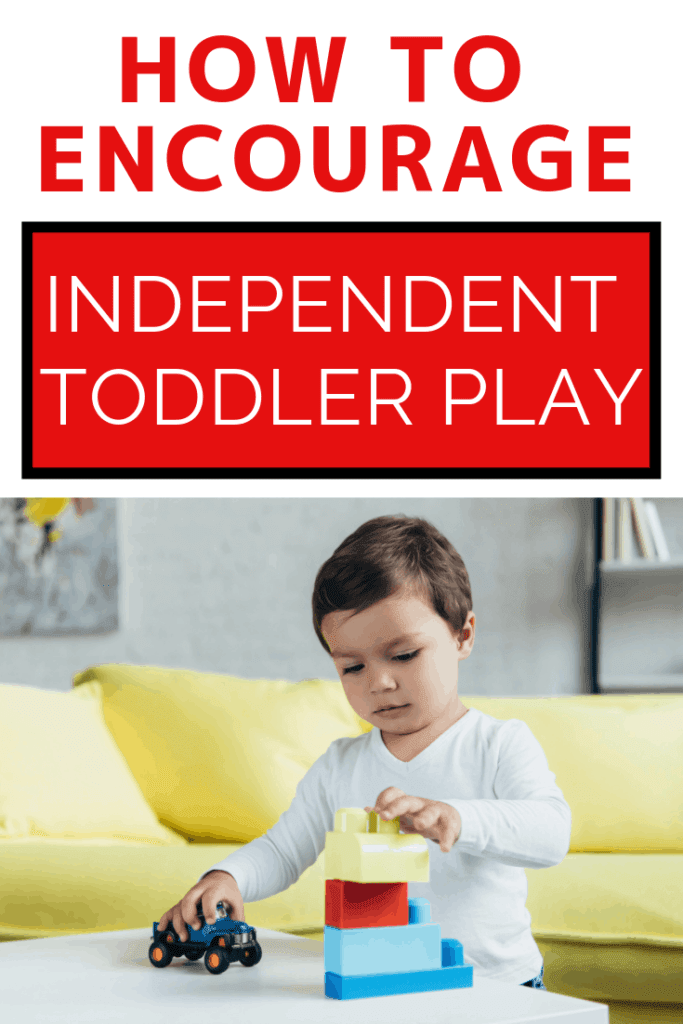

Kayla O’Neill has a master’s degree in education as well as a bachelor’s degree in special education with an emphasis in early childhood education. She has been working as a developmental therapist with babies and toddlers in early intervention since 2012. She is also a mom with two young children.